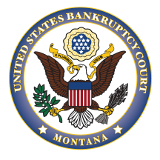You are here
All FAQs
While the information presented below is accurate as of the date of publication, it should not be cited or relied upon as legal authority. It is highly recommended that legal advice be obtained from a bankruptcy attorney or legal association. For filing requirements, please refer to the United States Bankruptcy Code (Title 11, United States Code), the Federal Rules of Bankruptcy Procedure (Bankruptcy Rules), and the Local Rules for the United States Bankruptcy Court for the District of Montana.
-
May I fax you a motion?
No. The Court does not accept fax filings of any kind.
-
When I file a motion, who should be listed on the "Certificate of Service"?
You should list all parties in interest as required by Local Rule 9013-1(d)(2).
-
What is the Plan of Reorganization?
The plan, generally filed by the debtor, states how the debtor proposes to pay their various debts. Creditors and interest holders have an opportunity to object to a proposed plan and it does not become effective unless the court approves it after a hearing on the plan and any objections filed are addressed.
-
How do I contact the trustee in a case?
The trustees each have their own offices. They are not affiliated with the clerk's office. The address and telephone numbers are available either through individual bankruptcy case party information data, from the telephone directory, or on the U.S. Trustee's web site.
-
What is the purpose of the trustee?
In Chapters 7 and 13, a trustee is appointed by the U.S. Trustee in order to administer the case. The trustee in these cases conducts the 341(a) meeting of creditors, keeps records, makes reports and recommendations regarding each case, and is primarily responsible for disbursement of the estate's money to creditors who file claims. The trustee has many other duties but these are the basic functions. In a Chapter 11 case, a trustee may be appointed by the U.S. Trustee, but only after a motion is made by a party in interest and is so ordered by the court. For more information about trustees, go to the U.S. Trustee web site.
-
Now that I have filed a proof of claim, when will I get my money?
In a chapter 13 or 11 case, money is generally distributed after a plan has been confirmed. In a chapter 7 case (if non-exempt assets are available for liquidation) the trustee will liquidate assets and make a determination of the distribution of assets after review of all claims and expenses. The trustee will file a “Distribution Report” indicating how the assets will be distributed and the percentage of recovery, in any, to those creditors who filed claims. Some cases are more complicated than others and the trustee may have more difficulty with liquidation.
-
What is a proof of claim?
A proof of claim is a written statement setting forth the amount and basis for the creditor's claim. A proof of claim must conform to the Official Form B410. Information about filing a Proof of Claim is available on the back of the Meeting of Creditors Notice for asset cases or if the case is later determined to be an asset case, you will be notified and the claim form is available for download from the Official Bankruptcy Forms section of the U.S. Courts website. Follow the instructions in completing the form and fill it out completely including date and signature. The proof of claim can be electronically filed here.
-
Do I have to hire an attorney to get the money owed me?
Each bankruptcy case involves a different set of circumstances and some are more complicated than others. It is your decision as to whether or not you need legal representation. The clerk's office is prohibited from recommending, advertising, or promoting the services of any law firm or attorney.
-
Do I have to attend the 341(a) meeting to get my money?
No. However, the business of the 341(a) meeting may be of interest to you as the meeting includes the examination of the debtor(s) under oath and, in a Chapter 7 liquidation case may include the election of a trustee or of a creditors commitee. This is your opportunity to ask the debtor(s) questions related to their financial affairs. This may also be a reason for a creditor to attend the 341(a) meeting.
-
How long will my bankruptcy show on my credit record?
The Fair Credit Reporting Act, 6 U.S.C. Section 605, is the law that controls credit reporting. The law states that credit reporting agencies may not report a bankruptcy case on a person's credit report after ten (10) years from the date the bankruptcy case is filed. Other bad credit information is removed after seven (7) years.
The bankruptcy court has no influence over these reporting policies.
For more information, please visit the Federal Trade Commission website. Use the research window to locate the publications:
- “How to Dispute Credit Reporting Errors”, and
- “Fair Credit Reporting.”
